Caulker excited by Sierra Leone captaincypublished at 17:28 BST 4 April 2022
Steven Caulker hopes he can learn from predecessor Umaru Bangura as he takes on the captaincy of Sierra Leone.
Read MoreSteven Caulker hopes he can learn from predecessor Umaru Bangura as he takes on the captaincy of Sierra Leone.
Read MoreSamba Cyuzuzo
BBC Great Lakes
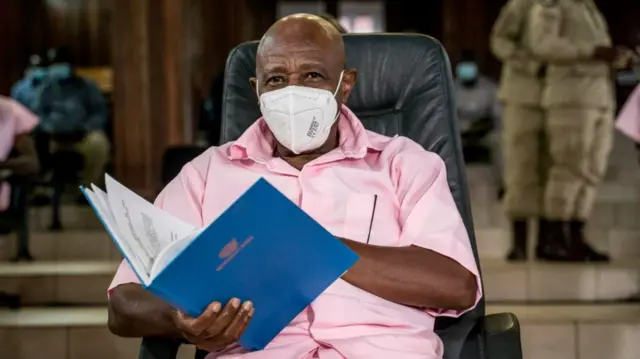 Image source, AFP
Image source, AFPPaul Rusesabagina was accused of terrorism charges in 2019
An appeal court in Rwanda has upheld the 25 year-prison sentence of Paul Rusesabagina as it declared him guilty on terror charges.
The subject of the Hollywood movie about the Rwandan genocide, Hotel Rwanda, Rusesabagina has boycotted court proceedings since March 2021, saying they were unfair.
The prosecution had requested that his sentence be increased to life in prison but this was rejected.
The court reduced the sentence of Callixte Nsabimana, known as "Sankara", the former spokesperson of the FLN rebel group linked to Rusesabagina, from 20 to 15 years.
The court said the two were guilty of deadly attacks conducted by the rebel group in south-west Rwanda in 2019, but that Nsabimana had apologised and cooperated with the court during trial.
Rusesabagina was tricked into a private jet from Dubai to Kigali in August 2020, arrested and paraded to media before the trial against him.
The appeal court has also upheld the sentences of another 19 co-accused, mostly former FLN members.
Rusesabagina’s relatives who live in Belgium and the US have condemned his rendition and trial in Rwanda.
A Nigerian atheist accused of blasphemy against Islam has appeared at a high court in the northern Nigerian state of Kano.
A group of Muslims had filed a petition to the authorities against Mubarak Bala after he allegedly posted uncomplimentary messages against Islam on social media.
The 37-year-old is president of the Humanist Association of Nigeria, and was arrested by the authorities in 2020 in neighbouring Kaduna state and later transferred to Kano, his home state.
He denies the blasphemy charges filed by the Kano state government.
He was taken to the Kano state High Court on Monday by security guards from a prison where he had been detained. Wearing a white T-shirt, Mr Bala appeared relaxed and sometimes smiled during the court sitting.
The court has rejected his bail application because of what the judge called his "safety". The trial is expected to continue on Tuesday.
Kano is one of around a dozen states in northern Nigeria where Sharia law is practised along with Nigerian secular laws.
But Mr Bala’s trail is taking place in a secular court. He could have faced the death penalty if tried in Sharia court.
UN human rights experts and a number of international rights groups have condemned his continued detention and called for his release.
Mubarak Bala renounced Islam in 2014. After his decision, he was then deemed mentally ill in the predominantly Muslim region and reportedly taken to a psychiatric hospital before being released.
 Pumza Fihlani
Pumza Fihlani
BBC News, Johannesburg
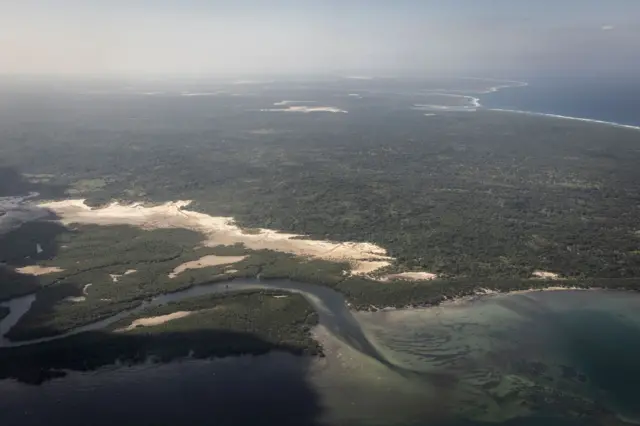 Image source, AFP
Image source, AFPThe resource rich Cabo Delgado has witnessed a violent Islamist insurgency since 2017
The Southern African Development Community (Sads) has committed to continuing to help fight jihadist groups in northern Mozambique.
The mission will see a continued presence of military personnel there for the next few months, with the long-term plan being to de-escalate the violence and help to bring stability to the region.
At a troika meeting in Pretoria on Sunday, South Africa’s International Relations Minister Naledi Pandor told her counterparts that the Sadc mission had made good progress in repelling attacks over the past year.
She added that one of the aims of the Sadc presence would be ensure the reconstruction of Cabo Delgado, a region rich in gas.
The meeting also heard that the EU has committed to funding the mission, and would offer humanitarian as well as military assistance.
"My decision to change coaches saved my life and my family," a survivor tells the BBC.
Read MoreEmery Makumeno
BBC News, Kinshasa
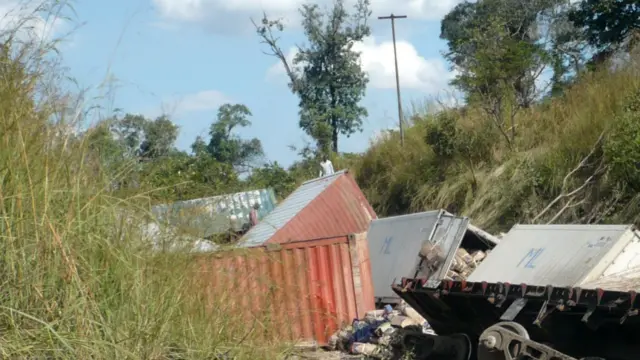 Image source, AFP
Image source, AFPTrain accidents are common in DR Congo (archive photo)
An eight-carriage cargo train derailed as it was traveling from the Lualaba to Kasaï province, in south-eastern Democratic Republic of Congo.
Clémentine Lutanda, a local administrator in Lubudi district where the train began its journey, tells the BBC that seven people died and 14 were injured. Among the wounded, five have been admitted for treatment.
She also said that the train derailed on Sunday around 19:00 local time (18:00 GMT).
The National Railways Company, SNCC, has not yet said what caused the accident, but DR Congo's Transport Minister Cerubin Okende told reporters that an investigation is under way to find out.
In March, another train derailed in DR Congo killing 75 people and injuring 125 others.
The country's rail network is dates back to colonial times and remains in very poor conditions with regular accidents.
 Issa Abdull
Issa Abdull
BBC Business Journalist
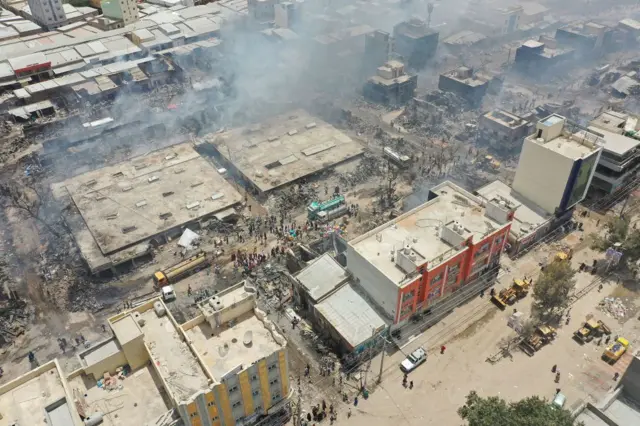 Image source, AFP
Image source, AFPDetails are emerging about the destruction caused by Friday's massive fire that gutted down the main open-air market in Hargeisa, the capital of the self-declared republic of Somaliland.
A commission set up by the local administration says the fire may have destroyed properties worth more than $1bn (£840m).
The cause of the fire has not been established.
Trade at the Waheen market was the lifeline of hundreds of thousands of low-income families in Hargeisa.
It also served people from Ethiopia, Djibouti and some parts of Somalia and is thought to be the third largest market in the Horn of Africa.
World leaders, including British Prime Minister Boris Johnson, have promised to support rebuilding efforts.
Somalia's Prime Minister Mohamed Hussein Roble has said his government would release $11.7m as part of an emergency response to the fire.
Somaliland declared independence from Somalia 30 years ago following the collapse of Siad Barre's government in 1991, but is yet to receive international recognition
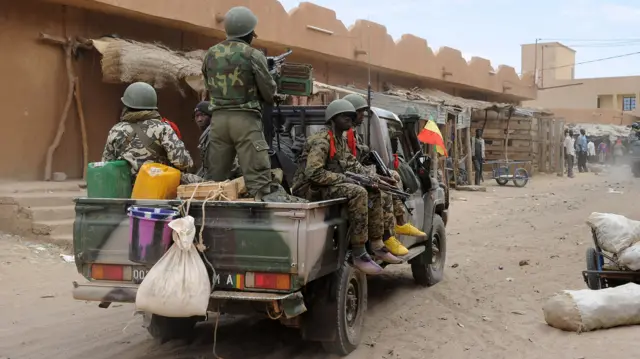 Image source, AFP
Image source, AFPMali has been battling an insurgency since 2012
The United States has expressed concern over an "extremely disturbing report" that many people had been killed in central Mali last week.
It said in a statement , externalthat there were some conflicting accounts on the reported massacre blaming the "unaccountable" Russian Wagner group for many civilian deaths, while others pointed to the Malian armed forces targeting violent groups.
The State Department said there was a need for the Malian transitional authorities to allow impartial investigations into the tragic events.
"Failure to provide a thorough and credible accounting of the facts and accountability will only serve to sow divisions in Malian society... and drive communities into the hands of violent extremist groups, and create conditions for more violence," it said.
Mali said over the weekend that it had killed more than 200 combatants in an operation between 21 and 31 March.
It came amid allegations on social media that dozens of civilians had been killed.
One of Kenya's most prominent women fighters during the struggle for independence has had her locks cut by the former first lady after more than 60 years.
Kenyans online are questioning the significance of such symbolic act and asking why now?
Muthoni Kirima who is aged over 90, had her long grey-haired dreadlocks shaved in a public event on Saturday - which some saw as a political stunt.
Kenyans who fought in the Mau Mau war of liberation, which lasted between 1952 and 1960, are said to have vowed that they would never shave their hair for as long as the British colonialists ruled the land.
But Ms Kirima was among the few who kept her locks after Kenya gained independence in 1963, even after many fighters had cut theirs.
It was a mark of defiance, and a reminder of the pain and perseverance that they had to go through fighting for independence – which she reckoned was not appreciated by successive governments.
Allow X content?
This article contains content provided by X. We ask for your permission before anything is loaded, as they may be using cookies and other technologies. You may want to read X’s cookie policy, external and privacy policy, external before accepting. To view this content choose ‘accept and continue’.
On Saturday, her six-foot locks were cut by former First Lady Mama Ngina Kenyatta - the mother of the current president. The hair was wrapped in the Kenyan flag and is to be stored in a museum to signify its history.
The event, held in the central county of Nyeri, was deemed a historic event and was attended by other veterans of the war and Kikuyu council of elders.
“This signifies that am contented that our country has had freedom, at last, generations are now free, what we fought for in the forest during clamour for freedom has finally been achieved,” Ms Kirima is quoted as saying.
Some Kenyans have however been questioning whether what she was fighting for has been fulfilled, with some terming it a betrayal.
Others say this is a “grave insult” to the freedom struggle as they ask what could have changed for her to make the decision.
Some Kenyans have also accused politicians of taking advantage of an elderly woman for political gain – as Kenya prepares for general elections in August.
It comes as opposition leader Raila Odinga, who President Kenyatta has been supporting for the presidency, is struggling to get support from the Mt Kenya region - where Ms Kirima comes from.
South Africans are offering their congratulations to DJ Black Coffee who won his first Grammy award on Sunday.
He won the best dance/electronic music album category for his Subconsciously album.
Black Coffee dedicated his win to upcoming African talents.
“African kids who are watching, they may think they don’t stand a chance to get on a global stage like this. I want to just say to them it is possible," he said.
President Cyril Ramaphosa has thanked him for "inspiring a new generation of talent to take over the world".
Allow X content?
This article contains content provided by X. We ask for your permission before anything is loaded, as they may be using cookies and other technologies. You may want to read X’s cookie policy, external and privacy policy, external before accepting. To view this content choose ‘accept and continue’.
One Twitter user wrote: "A little boy named Nkosinathi Innocent Sizwe Maphumulo from KwaZulu-Natal grew up to become a Grammy winner on April 3, 2022. Black child, it is possible. Congratulations, Black Coffee."
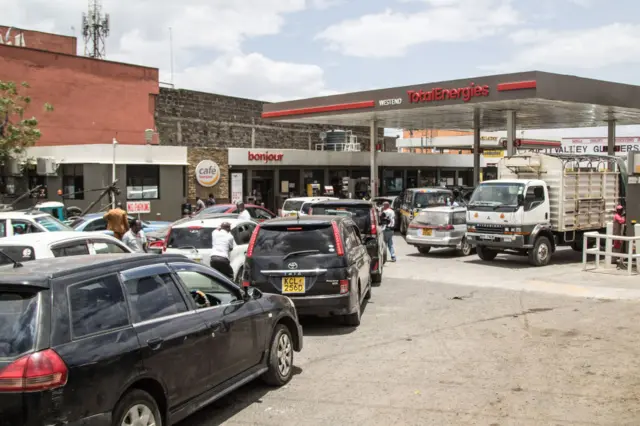 Image source, AFP
Image source, AFPA nation-wide fuel shortage continues to bite in Kenya, with major towns reporting long queues at the few filling stations that have the commodity.
There are conflicting reasons as to why the shortage is being experienced.
President Uhuru Kenyatta says it is due to the global crisis occasioned by Russia's invasion of Ukraine.
The national oil storage company - Kenya Pipeline - says there is enough stock and the regulator EPRA warning any company hoarding the oil with deregulation.
Analysts say delayed subsidies promised by the government to oil marketers to cushion consumers from the effects of the global crisis is causing the shortages
 BBC World Service
BBC World Service
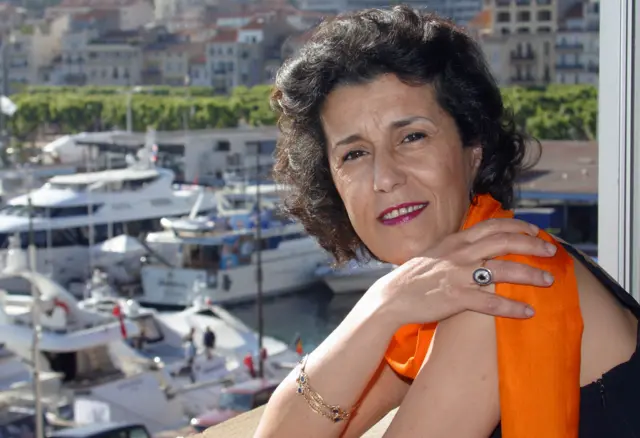 Image source, AFP
Image source, AFPThe 68-year-old director had been suffering from a long illness.
The award-winning Algerian film director, Yamina Bachir Chouikh, has died in Algiers.
She was best known for her film Rachida, the story of a young teacher’s struggle against terrorism in Algiers.
It won prizes around the world.
The movie, which took her five years to make, was the first to be directed by a woman in Algeria.
The Lumieres Cinema Association said the 68-year-old director had been suffering from a long illness.
 BBC World Service
BBC World Service
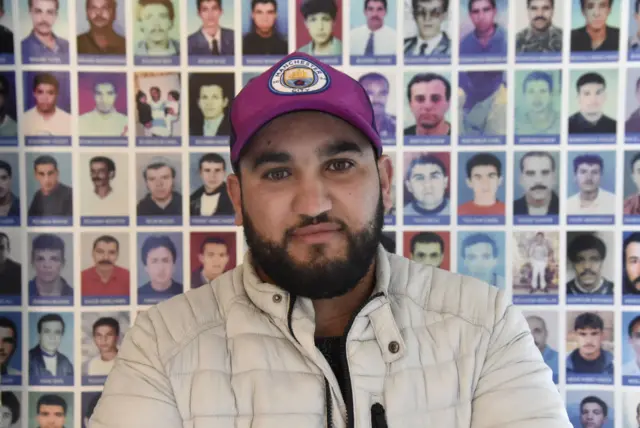 Image source, AFP
Image source, AFPDetained activist Zaki Hannache is among those pardoned
Algeria’s President Abdelmadjid Tebboune has pardoned more than 1,000 prisoners to coincide with the holy month of Ramadan.
In a statement his office said an additional 70 protesters from the pro-democracy Hirak movement – who are awaiting trial for public order offences - would be offered clemency.
Among those released was a rights campaigner, Zaki Hannache, who was arrested in February for allegedly promoting terrorist acts and spreading false news.
The Hirak protests rocked major cities in Algeria starting in early 2019, forcing long-time president Abdelaziz Bouteflika to step down months later.
Protests continued even after Mr Tebboune came to power. He was rejected by the Hirak who regarded him as an extension of the old political system.
Kalkidan Yibeltal
BBC News
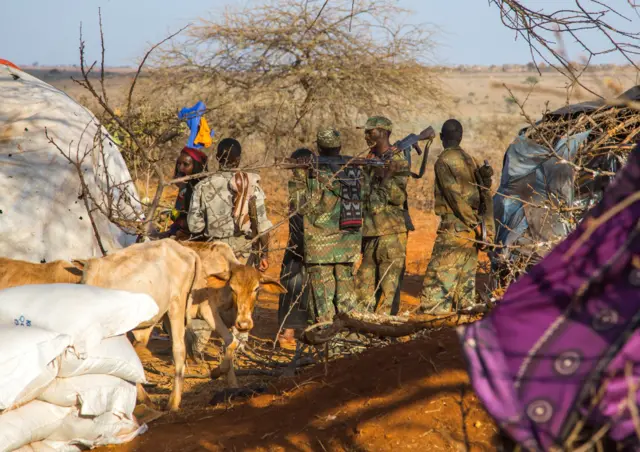 Image source, Gett
Image source, GettClashes have continued between government forces and OLA in Oromia
Clashes between armed men and security forces have been reported in the southern Ethiopian town of Moyale close to the border with Kenya.
A local official told the BBC that the clashes occurred between Saturday evening and Sunday morning.
The official claimed the armed men were members of the rebel group Oromo Liberation Army (OLA), but did not disclose if there were any casualties.
The incident is yet another indication of rising insecurity in the southern and western part of the country.
A humanitarian truce agreed between the government and Tigrayan forces has ignited hope for a resolution to the 17-month civil war in the north.
But in Oromia, the country’s most populous region, clashes have continued to be reported between government forces - which include the army and regional police - and the OLA.
On Saturday a top military official, Col Girma Ayele, said security forces were taking “decisive” measures against the OLA in what he called a “coordinated operation.”
The OLA on their part say they are winning battles.
Odaa Tarbii, a spokesperson for the group, claimed in a tweet on Monday that government forces sustained “heavy causalities” in a place called Malka Lammii in southern Oromia.
There are concerns that instability in multiple places could exacerbate the humanitarian crises across the country.
A combination of drought, conflicts and disease outbreaks could result in more than 20 million Ethiopians requiring humanitarian assistance this year, according to the UN.
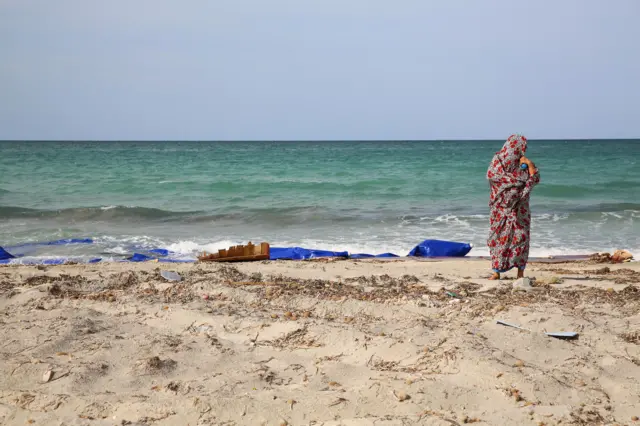 Image source, AFP
Image source, AFPHundreds of African migrants die every year trying to cross the Mediterranean sea to Europe
The head of the UN refugee agency has asked Europe to be generous and welcoming to other migrants, just as it has with Ukrainian refugees, following the death of dozens of African migrants at sea.
It comes after 90 people died in international waters of the Mediterranean sea after setting off from Libya in an overcrowded boat.
The medical charity Médecins Sans Frontières said that only four people were rescued from the raft on Saturday.
The UNHCR chief, Filippo Grandi, said Europe had hosted Ukrainian refugees “generously and effectively” and should consider the same for other refugees.
"It must now urgently consider how to apply this to other refugees and migrants knocking, in distress, at its doors" he tweeted, external on Sunday.
Thousands of African migrants have been trying to cross the Mediterranean in recent years in search for a better life in Europe.
Some manage to reach their destinations but hundreds die each year in the perilous journey in overcrowded, often unseaworthy vessels.
The European Union has faced criticism for its close cooperation with the Libyan Coast Guard to cut numbers of migrants arriving on European shores.
Many migrants face further horrific abuses in Libyan detention centres on their return journey.
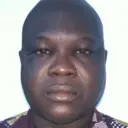 Nichola Mandil
Nichola Mandil
BBC News, Juba
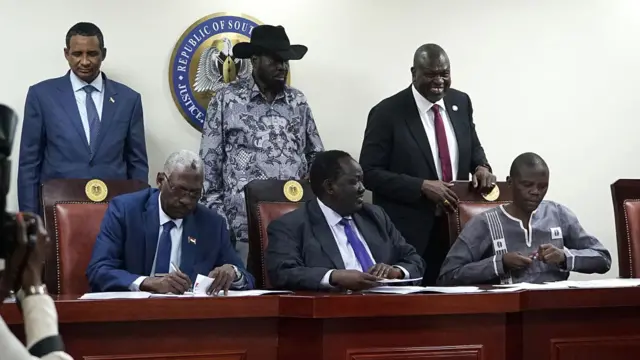 Image source, AFP
Image source, AFPThe deal was brokered by neighbouring Sudan
South Sudan rivals have signed an agreement on the formation of a unified armed forces command, a key pillar of a peace agreement signed in 2018.
The deal was signed on Sunday in the capital, Juba, following mediation by neighbouring Sudan.
Tensions between President Salva Kiir and First Vice-President Riek Machar had recently led to clashes between their respective forces.
The deal sets out terms of integrating opposition commanders into the armed forces.
President Kiir’s faction will have a 60% representation in key positions in the army, police and security forces. Mr Machar’s SPLM-IO and other opposition groups will occupy the remaining 40%.
The opposition will submit the list of their commanders within a period of one week.
It will be followed by the graduation of the unified forces and their deployment – which should not exceed a period of two months, according to the deal.
“People of South Sudan are yearning for peace and peace is about security and today we have made a milestone in that. We have agreed that we shall be moving forward,” said Major General Martin Abucha, who represented Mr Machar's faction.
“I want to call on my colleagues from the other sides that it is important to silence the guns so that South Sudan can prosper. Let there be not fighting, let there be no attacks,” he added.
The regional bloc, the Intergovernmental Authority on Development (Igad), has hailed the deal as “a major breakthrough”.
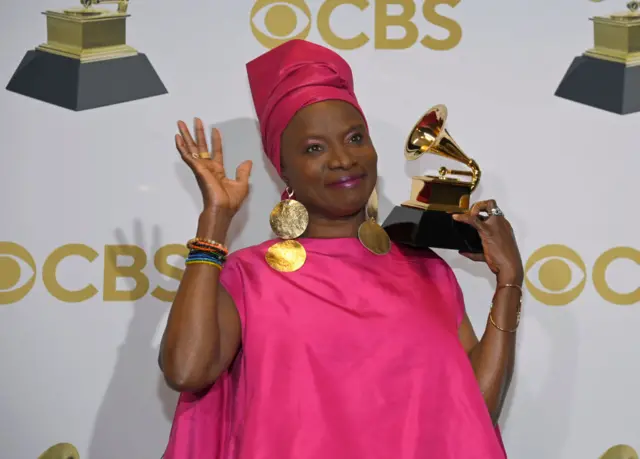 Image source, Getty Images
Image source, Getty ImagesBeninese singer Angélique Kidjo and South African DJ Black Coffee have won awards at this year's Grammys.
Kidjo won the best world music album of the year for her Mother Nature album. It featured Nigerian musicians Burna Boy, Yemi Alade and Mr Eazi.
The 61-year-old singer beat Nigerians Wizkid, Femi Kuti and Ghanaian Rocky Dawuni for the award. This was her fifth Grammy win.
In her acceptance speech, she paid tribute to Africa's new generation of artists who she said would take the world by storm.
South Africa's Black Coffee won the best dance/electronic music album. He won the award for his Subconsciously album.
It was his first ever Grammy award.
He accepted the award alongside his eldest son, Esona.
"I want to thank God for the gift of music and being able to share it with the world and heal souls and help people go through whatever they're going through in life," he said.
Allow X content?
This article contains content provided by X. We ask for your permission before anything is loaded, as they may be using cookies and other technologies. You may want to read X’s cookie policy, external and privacy policy, external before accepting. To view this content choose ‘accept and continue’.
Our proverb of the day:
Quote MessageWhen a hyena cries, you need to protect your sheep."
A Luo proverb sent by Agness Agilo in Lira, Uganda.
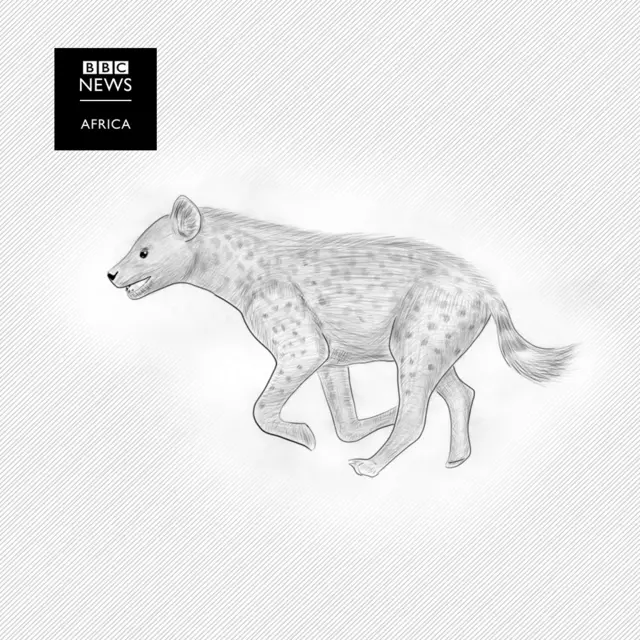
Women working to help communities caught up in Ethiopia’s brutal war talk about the immense challenges they face on the ground, and we hear the story of "Tsega", who was brutally attacked after she was forced to flee from her home. A co-production by BBC and Georgetown Institute for Women, Peace and Security.